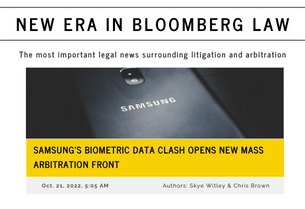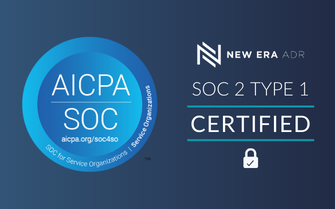
In this recent article published by Bloomberg Law, journalists Chris Brown and Skye Witley explore mass arbitration. You can also view the article here, Samsung’s Biometric Data Clash Opens New Mass Arbitration Front
Oct. 21, 2022, 5:05 AM
A legal tactic of flooding companies with thousands of individual arbitration claims is now appearing in disputes alleging biometric privacy law violations in Illinois, prompting attorney warnings to businesses about carefully considering the provisions they include in contracts with consumers and workers.
Last week, nearly 50,000 consumers asked an Illinois federal court to force Samsung Electronics Inc. to honor the arbitration provisions the company placed in user agreements. The consumers alleged that the tech giant violated the state’s Biometric Information Privacy Act by collecting, without proper consent, biometric data drawn from photos they took of themselves using Samsung phones and devices.
Samsung could be on the hook for paying millions of dollars in initial arbitration filing fees alone. It’s believed to be one of the first companies hit with mass arbitration involving BIPA claims, and is unlikely to be the last to face the dilemma, attorneys say.
“Mass arbitration is a clear example of, ‘Be careful what you wish for,’” said Thomas E. Birsic, a partner with K&L Gates in Pittsburgh. “The companies are the ones that wrote the contracts and the arbitration provisions, and the courts have basically said they have to live with them.”
Over the years, businesses have flocked to private arbitration to resolve workplace and consumer clashes outside of court, bolstered by US Supreme Court rulings that blessed contractual arbitration provisions as well as class action waivers. In response, plaintiffs’ attorneys turned to filing thousands of individual arbitration claims against gig companies and others in various employment and consumer disputes.
Businesses have criticized mass arbitration as a “shakedown.” Samsung, which didn’t respond to requests for comment for this story, previously characterized the tactic as an “attempt to abuse” its arbitration program and “weaponize” filing fees.
BIPA Arbitration
Illinois’ biometric privacy law lends itself to mass arbitration because companies that improperly collect biometric data face legal consequences for simple technical violations, said Ben Whiting, a partner at plaintiff’s firm Keller Postman, which has won several mass arbitration filings in employment and consumer cases.
“The law, when it was drafted, I think on its face was very favorable for the plaintiffs,” Whiting said. “I think that as the Illinois Supreme Court has issued some sort of fundamental rulings interpreting the law, it has become even more favorable to the plaintiffs.”
Eli Wade-Scott, a partner who leads Edelson PC’s class action practice, agrees.
“I think that lawyers are looking to BIPA now in the mass arbitration context, because there’s a well-established market for how these cases should settle,” Wade-Scott said.
Individual arbitration poses risks for businesses because of the potential absence of complete finality, Whiting said. Resolutions of individual claims through arbitration, which are difficult to overturn, don’t preclude another firm from findinga new round of clients for arbitration, he said.
Careful Contracting
For the few law firms with the administrative capital to identify and file thousands of individual claims, mass arbitration essentially allows for collective action against a company that includes class action waivers in its contracts, said Professor Kristen Blankley at the Nebraska College of Law. Blankley teaches arbitration and alternative dispute law at the university.
“What these types of cases are showing is the real limitations of class action waivers,” Blankley said, adding that, in both arbitration and courts, companies are faced with huge costs when claimants win.
Companies have fought back against mass arbitration by arguing before courts that it’s nothing more than a veiled form of class action, but the courts haven’t been receptive to their pleas, Birsic of K&L Gates said.
The heart of the problem for companies is the enormous settlement leverage it creates for the claimants, Birsic said. “When plaintiffs’ lawyers file tens of thousands of claims, the company can suddenly be faced with multimillion-dollar fees before a claim has even been heard.”
A recent $228 million judgment in a BIPA class action against BNSF Railway shows how large the underlying damages could be in a mass arbitration involving BIPA claims, and could increase the settlement leverage for claimants.
Some companies have dropped arbitration clauses from their contracts after being flooded by individual arbitration claims. Amazon provides a recent example. Faced with 75,000 arbitration claims from consumers who alleged its Echo devices recorded them without their consent, Amazon announced in July 2021 that it was dropping arbitration clauses from its consumer contracts.
Arbitrators Adapt for Mass Arbitration
The fees charged by arbitration organizations have played a central role in the rise of mass arbitration, and the organizations themselves have an independent role to play in adapting to the phenomenon, said Rich Lee, CEO of New Era ADR, a recently launched arbitration organization.
New Era has developed a new fee structure to reduce the settlement pressure on companies, and new procedures aimed at making it easier for large numbers of similar claims to be heard and resolved through arbitration.
“Our approach borrows principles from multidistrict litigation in our courts, where select ‘bellwether’ cases can be heard initially and precedent can be created for cases that follow,” he said. “Those who feel that their cases are different can present arguments about why they’re different, but ultimately we can work our way through the claims so that individuals can have their cases considered in a more timely and efficient manner.”
The American Arbitration Association also has developed a mass arbitration fee schedule and new procedures, including scheduling orders, limitations on briefs and discovery, and the use of a process arbitrator to decide issues such as the allocation of fees, according to Wesley Prichard, an associate with K&L Gates in Pittsburgh.
But not all parties to mass arbitration are happy about new procedures being developed by the arbitration authorities.
Plaintiffs’ attorneys in a mass arbitration against DoorDash Inc. challenged the mass-arbitration procedures of the chosen arbitrator, CPR Dispute Resolution Services LLC, arguing that CPR created the new procedures at the gig company’s request and with the input of its lawyers.
That challenge was eventually rejected by Judge Edward Chen of the US District Court for the Northern District of California, who allowed the mass arbitration to proceed under the CPR procedures.
The case shows that procedural innovations are likely to spark their own legal battles and an outbreak of “private procedural warfare,” said Maria Glover, a Georgetown Law professor who has studied mass arbitration.
“Eventually the courts will get involved here and will try to make sure that the procedures stay within certain boundaries,” she said, “but how many entities will be subject to the kind of market pressures that push them toward arbitral fora that don’t stay within those boundaries?”
To contact the reporters on this story: Skye Witley at [email protected]; Christopher Brown in St. Louis at [email protected]
To contact the editors responsible for this story: Jay-Anne B. Casuga at [email protected]; Nicholas Datlowe at [email protected]
To learn more about how New Era ADR is disrupting the ADR space, visit us at https://www.neweraadr.com/adr-platform/arbitration/




